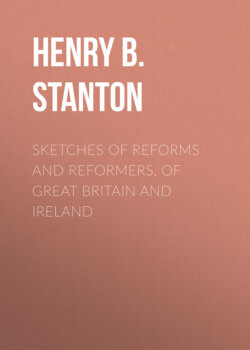Читать книгу Sketches of Reforms and Reformers, of Great Britain and Ireland - Henry B. Stanton - Страница 8
На сайте Литреса книга снята с продажи.
ОглавлениеHardy, whose case was extremely perilous, was first set to the bar. His trial lasted nine days. Tooke's came next, and Thelwall's next; when the prosecutors, frantic with rage and mortification at their signal overthrow, abandoned the contest. When Tooke was acquitted, the joy of the people knew no bounds. He was an old reformer, had ever been the steady advocate of popular rights, and was the idol of the Radicals. He had suffered much before in the common cause. His library had been repeatedly ransacked for treasonable papers, his family insulted, and his person again and again thrust into prison. And now they had seen him stand for six days, battling with the Court which lowered upon him, and bearing unruffled the taunts with which the Government witnesses had poorly withstood his searching cross-examination, contending for a life whose every pulsation had been given to the service of the people. When the foreman pronounced the words, "Not Guilty," the arches of Old Bailey rang with plaudits. After addressing a few words to the Court, he turned to Scott, and said: "I hope, Mr. Attorney General, that this verdict will be a warning to you not to attempt again to shed men's blood on lame suspicions and doubtful inferences." He then thanked the jury with much emotion for the life they had spared to him. The entire panel shed tears—the very men who had been so obviously packed to convict him, that at the opening of the trial Erskine said, "Mr. Tooke, they are murdering you!" The populace bore the old patriot through the passages to the street, where they sent up shout upon shout. It was a great day for Reformers, and its anniversary is still celebrated by the Radicals of England.
Erskine's speech for Hardy (whose case was very critical, and the first one tried,) is one of the most splendid specimens of popular juridical eloquence on record. Owing to the running contests on points of law and evidence, constantly kept up while the trial went on, he lost his voice the night before he was to address the jury. It returned to him in the morning, and he was able to crowd seven hours full of such oratory as is rarely heard in our day. He regarded Hardy's acquittal or conviction not only as the turning point in the fate of his eleven associates, but as settling the question whether constructive treason should for long years track blood through the land, or its murderous steps be now brought to a final stand. He made a superhuman effort for victory, and achieved it. Profound as was his legal learning, eminent as were his reasoning faculties, classical as was his taste, transcendent as were his oratorical powers, all conspiring to place him not only at the head of the English bar, but to rank him as the first advocate of modern times; yet all were overshadowed by the inflexible courage and hearty zeal with which he met this crisis of British freedom. With the combined power of the King, his ministers, and his judges, arrayed against his clients and against him as their representative, seeking their blood and his degradation, he cowered not, but maintained the home-born rights of his proscribed fellow-subjects with arguments so matchless, with eloquence so glowing, with courage so heroic, with constancy so generous, that his name will ever find a place in the hearts of all who prefer the rights of man to the prerogatives of power. But more than all; he exploded the doctrines of constructive treason, and established the law on the true foundation, that there must be some overt act to constitute guilt; and he reïnscribed upon the Constitution of England the obliterated principle, that Englishmen may freely speak and publish their opinions concerning the Government of their country without being guilty of treason—a principle, under whose protecting shield they now utter their complaints, their denunciations even, in the very ear of Majesty itself.[1]
